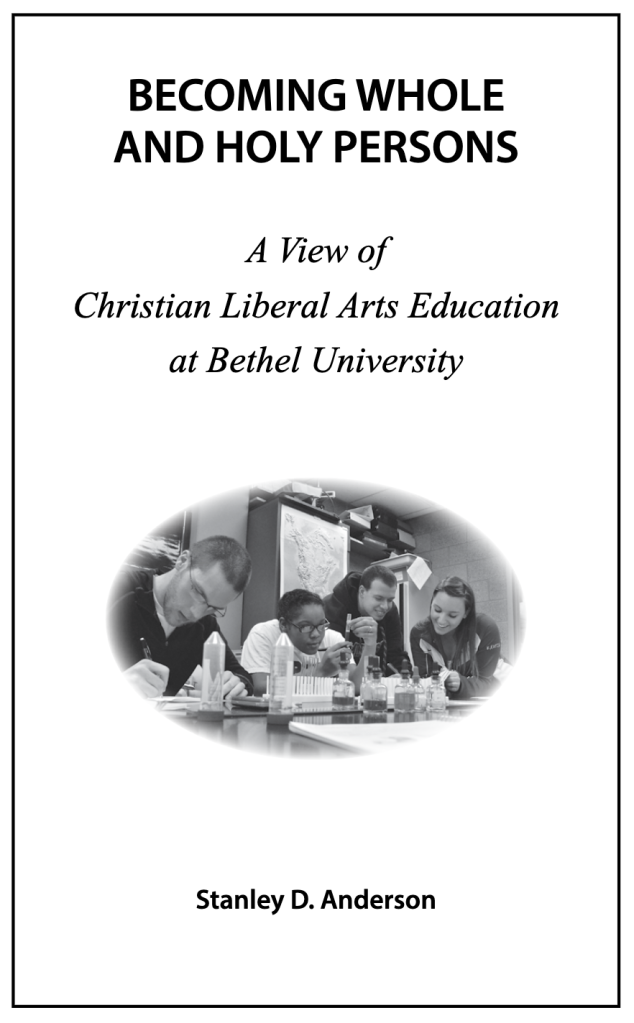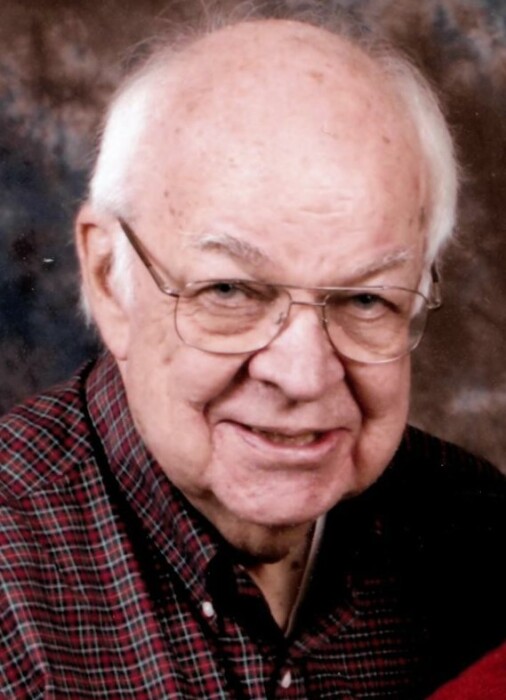We’re sorry to report the passing of Dr. Stanley D. Anderson Jr., who came to Bethel in 1968 and taught philosophy here for over 40 years. Stan passed away on January 3rd, at age 85, a year after the death of his wife, Ruth. Stan earned degrees from Wheaton College, Gordon Divinity School, Boston University, and the University of Minnesota and also served as a chaplain in the U.S. Army Reserves. You can read his full obituary here.
Several people connected to our department spoke at Stan’s memorial service last Friday: his son Mark, a History major who graduated from Bethel in 1994; retired philosophy professor Paul Reasoner; and current philosophy prof Sara Shady, who was kind enough to share her remarks below.
I am honored to speak on behalf of the current faculty at Bethel University, and specifically on behalf of the faculty in the Department of History, Philosophy, and Political Science, as we honor the legacy of a giant in the history of Bethel University.
I first met Stan at the Minneapolis/St. Paul airport in May 2002, where he and Paul Reasoner were picking me up for a 2-day job interview. I had been invited to interview for a job in Philosophy at Bethel. And, to be honest, I wasn’t even sure if I wanted the job. I was still finishing my dissertation and had no connections to Minnesota. But, within two days, I was confident that I wanted to work at Bethel, and Stan played a major role in that decision. At dinner one night during the interview process, Stan described for me how everything I’d been expressing about my own philosophy of teaching was a match to the mission and goals of Bethel. He encouraged me to think about Bethel as the best place to start my career. And I’m forever grateful for that conversation.
In his book, Becoming Whole and Holy Persons: A View of Christian Liberal Arts at Bethel University, a book that has influenced the Bethel community for decades, Stan wrote:
It is not unusual for American Christians to be bifurcated in their living and thinking – taking a Christian approach in home and at church, and a secular approach on the job and in school. Bethel’s mission is not simply to produce scholarly works where a Christian perspective is presented, but to develop mature Christian persons who bring their values and beliefs to bear on all of their study and learning. The ultimate locus for the integration of faith and learning is not a book, but in a person. (p. 116)
I could talk for hours about about the ways that Stan invested his life in the development of persons, influencing myself and many other students and faculty members, but for today I’ll focus on three things: Stan’s philosophy of education, his commitment to mentoring students (particularly those who weren’t at the top of the class), and his dedication to institutional leadership and service.
Stan’s philosophy of education
Whether Stan was teaching upper-level philosophy majors bound for graduate school or at-risk first year students in the “Fresh Start” program, his philosophy of education focused on developing Christians who would live well in the world. Stan and I share the belief that this work of whole person development is best done through the liberal arts and in the context of community. These commitments were lived out in Stan’s classrooms and in his work to build a developmental general education curriculum that still influences the core of a Bethel education today. In Stan’s courses, he always engaged students in personal and practical reflection… examples included writing a moral analysis of a personal ethical dilemma or reading stories of reconciliation in Israel and Palestine and applying concepts learned to the need for reconciliation in contemporary American society. For Stan, education was never merely a transmission of information, nor a self-interested pursuit of one’s one goals, but in his mind, learning exists for the purpose of becoming equipped to carry out the work of God in the world.
Once again quoting from Becoming Whole and Holy Persons… Stan wrote:

In its emphasis on the growth of the total person, Bethel places itself in the liberal arts tradition that goes back to Greek and Roman periods where the goal of education is to produce persons of competence and character who can be leaders within society. A Christian approach is different from a secular approach, however, in that it assumes that human beings are creatures made in the image of God… the goal of maturity is thus Christian maturity… The characteristics of maturity are stability, speaking the truth in love, and a communal relation that is likened to a body where all people are important and grow through love. (p. 64)
Stan’s emphasis on building communities where all people are important leads to my second focus for these remarks…
Stan’s commitment to mentoring all students
Stan had a heart for giving second chances, which led him to play an active role in the Fresh Start program, including developing a course called Orientation to College Studies that gives at-risk students, an opportunity in their first semester at Bethel to develop academic and personal skills to help them succeed in college. In the words of Professor Sam Mulberry, co-director of Bethel’s Academic Enrichment and Support Center, “Stan was a constant advocate and champion for academically at-risk students. There are lots of people in the world who have Bethel degrees largely because Stan believed in them and supported them.”
Stan’s commitment to mentoring students was also evident in his approach to utilizing teaching assistants. While many faculty, myself included, often hire TAs to help with menial tasks (like objective grading, making copies, returning papers, etc.), Stan always said that the position of teaching assistant is designed to benefit the student more than ourselves. In his mind, the goal of the faculty/TA relationship is (once again) tied to whole person development. For Stan, hiring a TA meant entering into a mentoring relationship focused on leadership and character development. Stan changed my own view of working with TAs. Just a year ago, a student asked to be my TA. If I’m honest, it would have never occurred to me to ask her. But I remembered Stan’s model and hired her. And it has been to both of our benefit.
Stan’s dedication to institutional service
Stan served Bethel diligently every year of his career, devoting significant amounts of time to roles like department chair and faculty president, and to leading several curricular initiatives and program designs. In today’s academy, research and publication are given the most emphasis, which can lead faculty to tighten boundaries around their time and complete only minimal service requirements. But Stan mentored me into a life of institutional service (alongside scholarship) very early in my career.

In fact, I often tell people that one of the most influential things to have happened in my twenty years at Bethel took place in my second year as a faculty member. Stan, who was then faculty president, assigned me to a major task force called to address a failed general education revision. I was only 28 years old and had only been at Bethel for two years. I remember some faculty vocally objecting to my placement on the task force, and Stan publicly defended his decision at a faculty meeting. Stan told me that he trusted me to do the work and believed that it would be a great opportunity for me to learn more about Bethel. He was right. I got to build relationships with faculty across the university, learn to see issues from different disciplinary perspectives, and come to understand the politics of institutional compromise. These lessons have continued to serve me well throughout my career.
In closing, I’d like to thank God for Stan’s life: for the gifts of his curricular development and writings about education that still inspire us today, for his mentorship that has influenced the lives of countless students and faculty, including myself, and for Stan’s tireless and dedicated service to others, for God’s glory and neighbor’s good.
– Sara Shady

